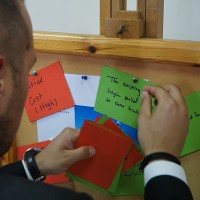27 February 2017 - 03 March 2017
Amman, Jordan
The role of risk perception in decision-making processes
RISK researchers Nadejda Komendantova, Jenan Irshaid and Love Ekenberg are running a series of multi-criteria decision making workshops that have been developed for different groups of stakeholders involved in, and affected by, the planning and deployment of electricity generation projects in Jordan. Together with the local partner at the School of Engineering at the University of Jordan, the workshops aim to collect data on the multi-criteria decision making processes of stakeholders from civil society organizations, finance and investments groups, academia, political decision-makers, community representatives, project developers and utility operators.
After a series of highly successful workshops in November 2017, where stakeholders met separately, this month's workshop will bring together representatives from all the different stakeholder groups for a final decision-making exercise.
Like the previous workshops, the upcoming session aims to explore how stakeholders rank and rate various criteria, including social, economic, political and environmental impacts. The data collected enables the researchers to observe how electricity technologies relate to energy-related development objectives at the national level and to conflict sensitivity at the local level. Furthermore, they elicit stakeholders’ opinions on how electricity-generation and electricity-conservation technologies contribute to selected sustainability criteria within the Jordanian context. The results of the workshops will be used to provide recommendations for for future energy policies in Jordan.
The workshops are part of the Middle East North Africa Sustainable Electricity Trajectories - MENA Select project, which is funded by the German Ministry of International Cooperation (BMZ) and implemented through the collaborative efforts of BICC-Bonn International Center for Conversion, Germanwatch, the University of Flensburg, the Wuppertal Institute and the School of Engineering at the University of Jordan. The project specifically aims to improve understanding of the complex relationships between different electricity pathways and sustainable development in three selected MENA countries: Jordan, Morocco and Tunisia.
FAST FACTS
- Jordan has the world's 8th largest oil shale resources, but until recently explorations were not economically feasible.
- Jordan is among the water poorest countries in the world, but is a world leader in water treatment for irrigation and urban water supply.


PROJECT WEBSITE
PUBLICATIONS


